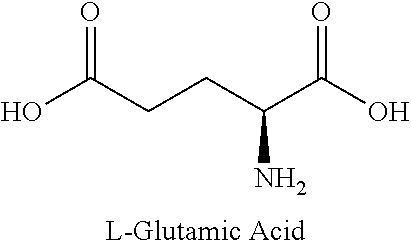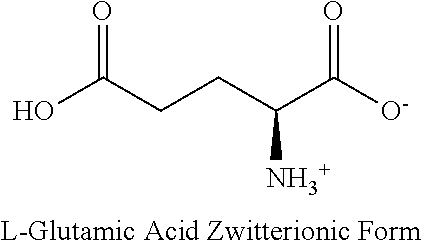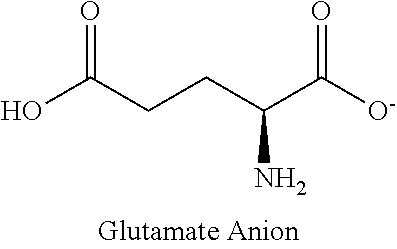Method for treating intestinal glutamine synthetase activity deficiency
a glutamine synthetase and activity-deficiency technology, applied in the field of monitoring intestinal glutamine synthetase activity deficiency, can solve the problems of glutamate toxicity and its related neurological and psychotic diseases, no precise biomarkers or single reliable blood test available to properly diagnose a broad class of neurological and psychiatric conditions, and no efficient way to monitor the efficacy of a particular treatment. achieve the effect of reducing the risk of contra
- Summary
- Abstract
- Description
- Claims
- Application Information
AI Technical Summary
Benefits of technology
Problems solved by technology
Method used
Image
Examples
example 1
Method for Monitoring Serum Glutamate Levels—Healthy Subject
[0160]The present method was applied to a subject (age 19, female) having no diagnosed neurological disorders and having a fasting serum glutamate concentration of 19.8 μmol / L. The postprandial serum glutamate level measured 60 minutes after taking 11.3 grams of dietary glutamate was 47.8 μmol / L, which was 28 μmol / L higher than fasting serum glutamate.
[0161]The present method demonstrates that the difference of postprandial to fasting glutamate levels is within the normal range of 30 μmol / L. The 1969 study by Peters describes normal levels for healthy individuals (Peters, Lin, Berridge, Cummings, & Chao, 1969). With the formula, the subject's percent deficiency is brought to 0%, showing that the subject is metabolizing dietary glutamate to glutamine normally and has no evidence of glutamine synthetase deficiency.
example 2
Method for Monitoring Serum Glutamate Levels—Subject with a Minor Lifestyle Related Glutamine Synthetase Deficiency
[0162]The present method was applied to a subject (age 23, male) having no diagnosed neurological disorders and having a fasting serum glutamate concentration of 23.8 μmol / L. The postprandial serum glutamate level measured 60 minutes after taking 11.3 grams of dietary glutamate was 54.6 μmol / L, which was 30.8 μmol / L higher than fasting serum glutamate.
[0163]The present method demonstrates that the difference of postprandial to fasting glutamate levels is slightly outside of the normal range of 30 μmol / L. With this value, the subject's percent deficiency cannot be brought to 0% and the values are inputted into the formula. The difference between the measurements of glutamate is divided by the difference between the measurements of glutamate of the subject with the highest recorded value for this difference, which is 187 μmol / L, with 30 μmol / L subtracted from both values....
example 3
Method for Monitoring Serum Glutamate Levels—Mild Glutamine Synthetase Deficiency
[0164]The present method was applied to a subject (age 19, female) having no diagnosed neurological disorders and having a fasting serum glutamate concentration of 20.2 μmol / L. The postprandial serum glutamate level measured 60 minutes after taking 11.3 grams of dietary glutamate was 75 μmol / L, which was 54.8 μmol / L higher than fasting serum glutamate.
[0165]The present method demonstrates that the difference of postprandial to fasting glutamate levels is outside the normal range of 30 μmol / L. With this value, the subject's percent deficiency cannot be brought to 0% and the values are inputted into the formula. The difference between the measurements of glutamate is divided by the difference between the measurements of glutamate of the patient with the highest recorded value for this difference, which is 187 μmol / L, with 30 μmol / L subtracted from both values. The resulting percentage comes out to be a 15...
PUM
| Property | Measurement | Unit |
|---|---|---|
| time | aaaaa | aaaaa |
| median survival time | aaaaa | aaaaa |
| time | aaaaa | aaaaa |
Abstract
Description
Claims
Application Information
 Login to View More
Login to View More - R&D
- Intellectual Property
- Life Sciences
- Materials
- Tech Scout
- Unparalleled Data Quality
- Higher Quality Content
- 60% Fewer Hallucinations
Browse by: Latest US Patents, China's latest patents, Technical Efficacy Thesaurus, Application Domain, Technology Topic, Popular Technical Reports.
© 2025 PatSnap. All rights reserved.Legal|Privacy policy|Modern Slavery Act Transparency Statement|Sitemap|About US| Contact US: help@patsnap.com



